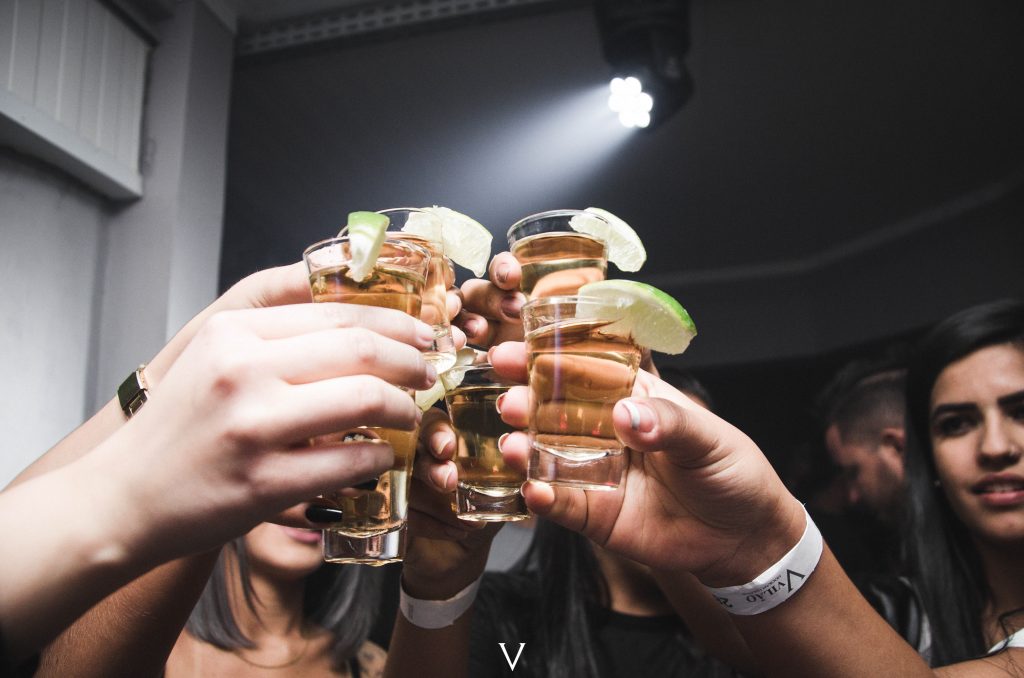Kaleidoscopic lights flash overhead while heavy bass vibrates through your bones and a waft of smoke invites you in. Friends are shouting to be heard over the pulsating rhythm, asking if you want a drink. One shot, then two, then maybe ten. Maybe something stronger. They pull you onto the dance floor, where you lose yourself in the music and an undulating sea of intoxicated feelings. Let’s play a game of truth or drink. Let’s spill all your secrets and get wasted…
This shouldn’t be normal, but it happens every weekend. In fact, I’ve lost count of how many times I’ve been invited to go out to various clubs around Sanlitun, otherwise known as the epicenter of teenage drinking and clubbing. Beijing has long been established as a city tolerant of such lifestyles regardless of age, and it’s no surprise why.
 Why clubbing in Beijing is so easy, and the problems it poses
Why clubbing in Beijing is so easy, and the problems it poses
Beijing has efficient, affordable transportation that runs during just about every hour, day or night. Given that most of the clubs open at 8pm and the subways are still running, teenagers can easily get to Sanlitun for no more than a few RMB. Likewise, even though the subway lines close at 11pm, Didis are always accessible, even at 5am. As such, the transportation system that Beijing prides itself on enables teenage clubbing.
In addition to easy transportation, there’s really no culture of checking IDs when buying alcohol or going into clubs. Anyone can go into a convenience store and walk out with bottles of whiskey and vodka, no questions asked. At clubs, it’s even worse. Free alcohol in some nightclubs is a very real concept, which encourages teenagers to get drunk. There’s virtually no limit to how much you can drink, because budget no longer becomes a problem.
Here is where the dangers of peer pressure come in. “Curiosity killed the cat” is a particularly prescient adage in the club scene. When you see your friends happily playing drinking games, it’s natural to wonder if drinking alcohol will make you equally as happy. “Have a shot! Play with us! Don’t worry, you won’t get drunk!” your friends say encouragingly. So, after some hesitation, you pick up a shot glass and join the game. More often than not, however, teenagers like myself don’t know the amount of alcohol they can handle before they lose themselves, much less leaving that power to their friends. Before you know it, you’re wasted with your friends, and…
Blackouts happen. “I remember times when I would wake up the day after clubbing and not remember a single thing from the night before,” one of my peers told me when I asked about her experiences at the club. “I had to look at videos my friends took to be like ‘Oh, that happened?’” Not having control over your body and completely losing your memory because of how intoxicated you are can easily result in strangers, or even friends, taking advantage of you. Put another way, it’s extremely easy to get yourself in very dangerous situations. Worst of all, you have no power to defend yourself. It’s how my friend’s cousin got raped.
All interviewees and sources spoke on the condition of anonymity.
Teenage clubbing doesn’t just negatively impact teenagers, it also affects parents. “I’m not worried about the drinking. I’m worried about predatory behavior in bars and clubs,” said one US parent of a Beijing teenager. “Having lived here for a while and been in my share of the city’s bars and clubs, I’ve seen brawls, I’ve seen sexual assaults, I’ve seen people passing out,” he said. “While I trust my child to make the right decisions, I don’t trust the drunken behavior of a room full of strangers.”
 What can we do about it?
What can we do about it?
The problems with teenage clubbing and drinking are nothing new. As long as there’s been alcohol and parties, there have been kids who want to indulge, and it will continue like this unless steps are taken to prevent it. As a Swedish citizen, I know that in Sweden, alcohol can only be bought in certain stores, with a crazy high tax. Like most countries around the world, clubs require the individual to show their ID, and measures are taken to prevent underage people from entering. Beijing should hop on this bandwagon and enforce the same rules. These changes make it more difficult for teenagers to buy alcohol anywhere, including convenience stores.
In addition to enforcing ID checks, there should be occasional random visits from the police to make sure that bar owners are following the right protocols, and only allowing those who are of age into their club. The looming sense of danger that surrounds not knowing when a check will take place acts as an effective deterrent because the teenagers know that if they are caught – and there’ll be a very real possibility of that happening – there will be legal consequences.
And yes, in China, there are federal laws meant to protect teenagers like me from the horrors of alcohol and drugs. For instance, Article 37 of Chinese Federal Law prohibits the sale of alcohol and tobacco to minors, and Article 2 identifies those under the age of 18 as minors. Yet, most clubs do not require an ID when entering, and anyone can buy alcohol or tobacco. So, all the clubs that are allowing minors in are breaking federal law and operators can be punished under Article 33.
It’s also important to note that even though Article 2 states that those under the age of 18 are minors, when faced with criminal charges, those who have reached the age of 16 must bear full criminal responsibility and face legal consequences. Everybody I know who frequents these clubs has reached the age of 16, but are not yet legal adults. Just something to think about…
The way I see it, allowing teenage clubbing to continue is a lose-lose situation for all parties involved. Not only does it cause safety concerns for the teens, but parents also worry, and club owners are risking their businesses. The good news is, this problem is solvable and no new legislation needs to be passed. It’s already written in the federal laws, it’s just a matter of enforcing them.
KEEP READING: Can Minors Purchase Alcohol in Beijing?
Images: Pexels



